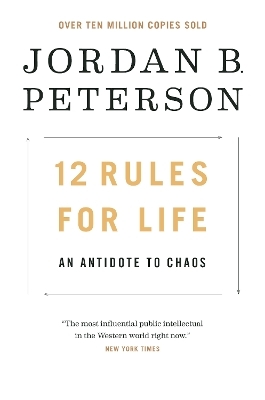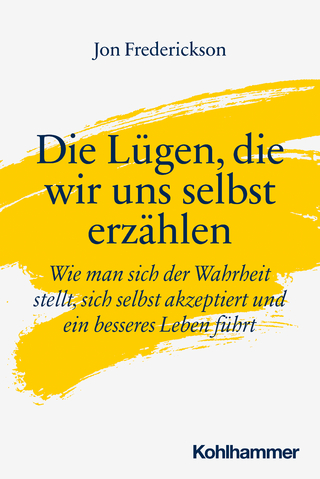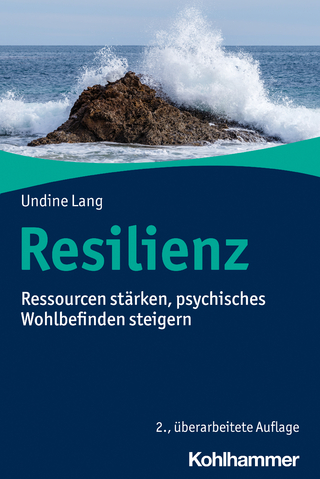
12 Rules for Life
Random House Canada (Verlag)
978-0-7352-7851-6 (ISBN)
#1 INTERNATIONAL BESTSELLER
What does everyone in the modern world need to know? Renowned psychologist Jordan B. Peterson's answer to this most difficult of questions uniquely combines the hard-won truths of ancient tradition with the stunning revelations of cutting-edge scientific research.
Humorous, surprising and informative, Dr. Peterson tells us why skateboarding boys and girls must be left alone, what terrible fate awaits those who criticize too easily, and why you should always pet a cat when you meet one on the street.
What does the nervous system of the lowly lobster have to tell us about standing up straight (with our shoulders back) and about success in life? Why did ancient Egyptians worship the capacity to pay careful attention as the highest of gods? What dreadful paths do people tread when they become resentful, arrogant and vengeful? Dr. Peterson journeys broadly, discussing discipline, freedom, adventure and responsibility, distilling the world's wisdom into 12 practical and profound rules for life. 12 Rules for Life shatters the modern commonplaces of science, faith and human nature, while transforming and ennobling the mind and spirit of its readers.
JORDAN B. PETERSON, raised and toughened in the frigid wastelands of Northern Alberta, has flown a hammer-head roll in a carbon-fiber stunt-plane, explored an Arizona meteorite crater with astronauts, and built a Kwagu'l ceremonial bighouse on the upper floor of his Toronto home after being invited into and named by that Canadian First Nation. He's taught mythology to lawyers, doctors and business people, consulted for the UN Secretary General, helped his clinical clients manage depression, obsessive-compulsive disorder, anxiety, and schizophrenia, served as an adviser to senior partners of major Canadian law firms, and lectured extensively in North America and Europe. With his students and colleagues at Harvard and the University of Toronto, Dr. Peterson has published over a hundred scientific papers, transforming the modern understanding of personality, while his book Maps of Meaning: The Architecture of Belief revolutionized the psychology of religion. The author lives in Toronto, ON. www.jordanbpeterson.com
A RELIGIOUS PROBLEM It does not seem reasonable to describe the young man who shot twenty children and six staff members at Sandy Hook Elementary School in Newtown, Connecticut, in 2012 as a religious person. This is equally true for the Colorado theatre gunman and the Columbine High School killers. But these murderous individuals had a problem with reality that existed at a religious depth. As one of the members of the Columbine duo wrote: "The human race isn't worth fighting for, only worth killing. Give the Earth back to the animals. They deserve it infinitely more than we do. Nothing means anything anymore." People who think such things view Being itself as inequitable and harsh to the point of corruption, and human Being, in particular, as contemptible. They appoint themselves supreme adjudicators of reality and find it wanting. They are the ultimate critics. The deeply cynical writer continues: "If you recall your history, the Nazis came up with a 'final solution' to the Jewish problem. . . . Kill them all. Well, in case you haven't figured it out, I say 'KILL MANKIND.' No one should survive." For such individuals, the world of experience is insufficient and evil-so to hell with everything! What is happening when someone comes to think in this manner? A great German play, Faust: A Tragedy, written by Johann Wolfgang von Goethe, addresses that issue. The play's main character, a scholar named Heinrich Faust, trades his immortal soul to the devil, Mephistopheles. In return, he receives whatever he desires while still alive on Earth. In Goethe's play, Mephistopheles is the eternal adversary of Being. He has a central, defining credo: "I am the spirit who negates and rightly so, for all that comes to be deserves to perish, wretchedly. It were better nothing would begin! Thus everything that your terms sin, destruction, evil represent- that is my proper element." Goethe considered this hateful sentiment so important-so key to the central element of vengeful human destructiveness-that he had Mephistopheles say it a second time, phrased somewhat differently, in Part II of the play, written many years later. People think often in the Mephistophelean manner, although they seldom act upon their thoughts as brutally as the mass murderers of school, college and theatre. Whenever we experience injustice, real or imagined; whenever we encounter tragedy or fall prey to the machinations of others; whenever we experience the horror and pain of our own apparently arbitrary limitations-the temptation to question Being and then to curse it rises foully from the darkness. Why must innocent people suffer so terribly? What kind of bloody, horrible planet is this, anyway? Life is in truth very hard. Everyone is destined for pain and slated for destruction. Sometimes suffering is clearly the result of a personal fault such as willful blindness, poor decision-making or malevolence. In such cases, when it appears to be self-inflicted, it may even seem just. People get what they deserve, you might contend. That's cold comfort, however, even when true. Sometimes, if those who are suffering changed their behaviour, then their lives would unfold less tragically. But human control is limited. Susceptibility to despair, disease, aging and death is universal. In the final analysis, we do not appear to be the architects of our own fragility. Whose fault is it, then? People who are very ill (or, worse, who have a sick child) will inevitably find themselves asking this question, whether they are religious believers or not. The same is true of someone who finds his shirtsleeve caught in the gears of a giant bureaucracy-who is suffering through a tax audit, or fighting an interminable lawsuit or divorce. And it's not only the obviously suffering who are tormented by the need to blame someone or something for the intolerable state of their Being. At the
| Erscheinungsdatum | 16.04.2019 |
|---|---|
| Verlagsort | Mississauga |
| Sprache | englisch |
| Maße | 127 x 196 mm |
| Gewicht | 357 g |
| Themenwelt | Sachbuch/Ratgeber ► Gesundheit / Leben / Psychologie ► Lebenshilfe / Lebensführung |
| Sachbuch/Ratgeber ► Gesundheit / Leben / Psychologie ► Psychologie | |
| Schlagworte | Anxiety • Chaos • Depression • dostoevsky • God • gulag archipelago • Health • Knowledge • Maps of meaning • Meaning • Myth • Mythology • Nonfiction • Norman Doidge • Personal Growth • Philosophy • philosophy books • Professor • Psychology • psychology books • Rules • Self Help • self help books • self help books best sellers • Self Improvement • The Gulag Archipelago • top rated books • wisdom |
| ISBN-10 | 0-7352-7851-2 / 0735278512 |
| ISBN-13 | 978-0-7352-7851-6 / 9780735278516 |
| Zustand | Neuware |
| Haben Sie eine Frage zum Produkt? |
aus dem Bereich


